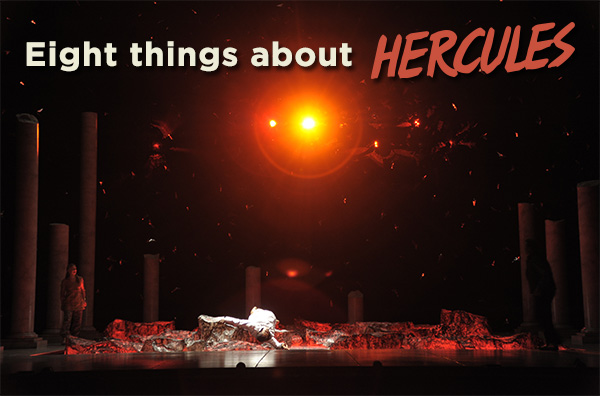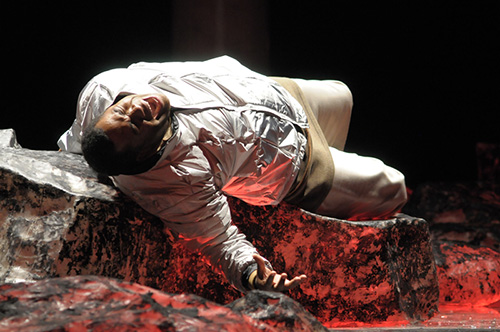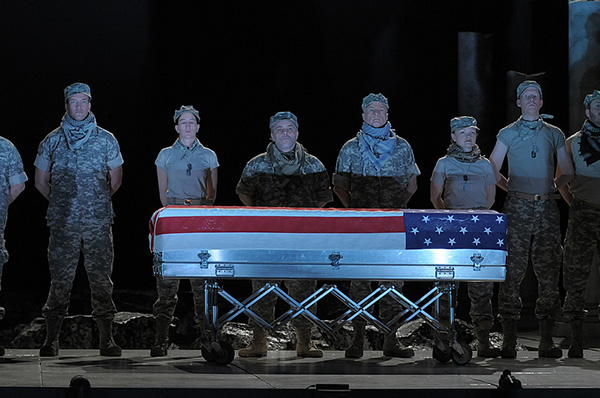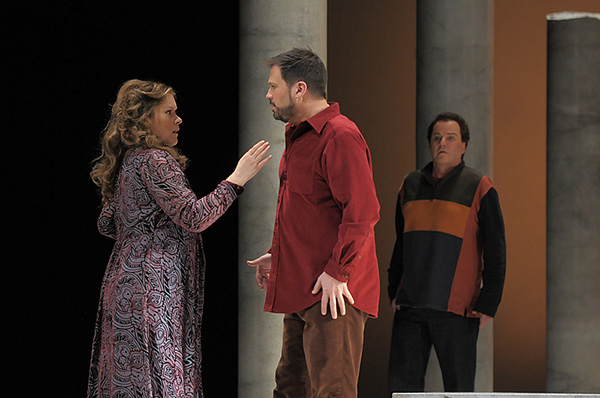-
Eight Things to Know About George Frideric Handel’s Hercules
By Danielle D'OrnellasPosted in HerculesBy Nikita Gourski, Development Communications Officer

This April, Handel’s Hercules has its COC premiere in a new co-production with Lyric Opera of Chicago. Here are eight key things you may want to know before you head to your seat!
1) Based on mythology, rooted in real life
Handel’s Hercules is based on an ancient Greek tragedy, Women of Trachis, written by Sophocles around 450 BC. In addition to being one of the most celebrated playwrights of his era, Sophocles was a war general who understood the emotionally intense – even dangerous – landscape that awaited soldiers and their families after a period of war. Though the subject derives from mythology, Sophocles’ treatment of it was profoundly human.2) Musical drama
Born in Germany in 1685, Handel moved to London, England, in his mid-20s and took the city by storm with his Italian-language operas. By the 1740s, however, conventional operas were declining in popularity in London and Handel turned his attention to oratorios, musical entertainments sung in English, based on Biblical stories, and performed unstaged (i.e. without scenery, costumes or stage action). Though Hercules (1745) had much in common with the oratorio genre, Handel himself called it a “musical drama,” perhaps recognizing the work’s hybridity: it incorporated operatic conventions (narrative-based structure, da capo arias) as well as oratorio forms (choral music, accompanied recitatives), yielding a new and powerful way of telling secular stories in the theatre.
3) The art of adaptation
The libretto was written by Thomas Broughton, an English clergyman, who in addition to relying on Sophocles’ stage play also spliced in material from Ovid’s Metamorphoses, and almost certainly Seneca’s Latin tragedy Hercules Oetaeus. Today, director Peter Sellars has compressed the libretto to bring its structure closer to the Greek play that inspired it, “putting Handel,” as Sellars says, “in direct collaboration with Sophocles.”4) Visionary director
American stage director Peter Sellars (Tristan und Isolde, 2013) is one of the most important and innovative figures in the performing arts today. Rather than supplying a perfumed escape from the world, Sellars’ productions have always sought to return us to the moral tensions and social problems of our day, with the ultimate aim of reenergizing the arts as a vehicle for moral action.“In making himself an artist whose preoccupations and concerns grapple with nothing less than the fate of humanity, Peter Sellars has created a body of work that will transcend epoch and place, style and fad.” Opera News

5) Hercules today
Sellars’ production focuses on post-traumatic stress disorder. Hercules is presented as a U.S. Army general who struggles to reunite emotionally with his family after returning home from war in Iraq or Afghanistan. The modern setting illuminates the universal elements of Handel’s work within a grid of contemporary signs – U.S. battle fatigues; Abu-Ghraib orange jumpsuits; flag-draped coffins – while emphasizing that the social and psychological toll of war isn’t a bygone relic, but an everyday reality.“An opera performance this great is plenty rare. But opera capable of inspiring moral action is for the ages.” Los Angeles Times
In addition to a number of other ancillary events engaging with veterans and their families, on April 4, Peter Sellars will sit on a panel that explores Hercules and the role of music in the rehabilitation and reintegration of those touched by war. Learn more about the Opera Exchange here.
6) War is hell
The minimalist sets are by George Tsypin, designer of the opening ceremony at the Sochi Olympics. Though clearly depicting the modern day – there is a backyard barbecue, cans of beer – the sets also work on a symbolic plane, as partially destroyed columns along the edges of the stage evoke ancient Greek architecture and the physical cost of battle. Combined with lighting designer James F. Ingalls’ use of dramatic reds and oranges, the impression is of a hellish place, scorched and devastated by war.
7) Dream team
The very same team who made Hercules such a hit in Chicago in 2010, are here in Toronto to revisit this poignant tragedy.Hercules: Grammy Award-winner American bass-baritone Eric Owens makes his COC debut in the title role. As Hercules, he “speaks to you even in his silences… and shakes you when he sings” Chicago Sun-Times.
Dejanira: British mezzo-soprano Alice Coote returns after her making her COC debut as the Composer in Ariadne auf Naxos, 2011. Her Dejanira “ranks with theatrical performances of legends” Los Angeles Times.
Lichas: American countertenor David Daniels returns to the COC after last appearing in Xerxes, 1999. He's been called “the most acclaimed countertenor of the day, perhaps the best ever” New York Times.
Hyllus: American tenor Richard Croft returns to the COC after more than twenty years (Così fan tutte, 1992). His performance as Hyllus is “profound” Los Angeles Times.
Iole: British soprano Lucy Crowe makes her COC debut as the imprisoned princess, and is “a major discovery” Chicago Tribune.
British conductor and Baroque specialist Harry Bicket returns to the COC after conducting Orfeo ed Euridice, 2011; Idomeneo, 2009; and Rodelinda, 2005. Conducting this production of Hercules in Chicago, he gave “a performance true to the spirit of Handel’s time yet truer still to Sellars’ stress points” Los Angeles Times.
8) Suffering, transformed
“Handel believed that the first way to go into a difficult or dangerous place is with a lot of beauty. So the music is just ravishingly beautiful. It transmutes the suffering into another place…” Peter Sellars. Explore Handel’s transformative score with our Hercules listening guide.Photos: (top) Lucy Crowe as Iole and Eric Owens as Hercules; (middle) Eric Owens as Hercules; (middle) A scene from Hercules; (bottom) (l–r) Alice Coote as Dejanira, David Daniels as Lichas and Richard Croft as Hyllus. All photos from the Canadian Opera Company/Lyric Opera of Chicago (LOC) co-production of Hercules, 2011, LOC. Photos: Dan Rest
